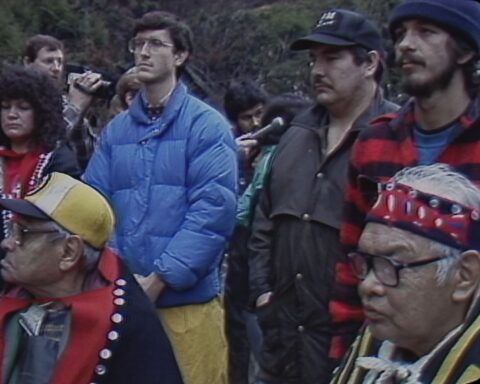The Magnitude of All Things
(Canada, 85 min.)
Dir. Jennifer Abbott
Environmental documentaries often evoke one of two emotions to inspire audiences to act. In one corner are the angry eco docs, films like An Inconvenient Truth or The 11th Hour that use dire forecasts and sensational images of raging floods, billowing smokestacks, and roaring fires to conjure fist-shaking rage. Other films like 2040 or KONELĪNE offer images of hope or beauty to remind audiences that the world is worth protecting. Films in the former category were helpful for drawing attention to climate change, but docs with the latter mood seem more productive in the end.
Director Jennifer Abbott, however, harnesses a new emotion that films about climate change have yet to experience: grief. The Magnitude of All Things moves with the unshakable sensation of grief and loss. It’s an unexpected and effective feeling, particularly as it arrives at a time when many audiences grieve for the sense of normalcy that 2020 has stripped from their lives. Abbott reflects upon the death of her sister Saille and sees her sense of loss within the larger cycle of sorrow rippling across the planet. Exploring climate change through the perspective of environmental grief, The Magnitude of All Things witnesses far corners of the world coping and adapting in the face of devastating losses—but also many people fighting for the world’s future. The doc navigates the space between anger and hope to emerge with a deeper sense of serenity. It’s as poignant as it is provocative.
If “climate grief” seems too abstract or waiflike a concept to swallow, rest assured that Abbott explains it perfectly clear. She recalls a warm day of summer in which the arrival of unseasonably early snow surprised her. Those snowflakes, Abbott reveals, were actually flakes of ash wafting in the wind from distant forest fires. Holding such a tangible fragment of death in her hands in lieu of the childlike joy of a cold snowflake on the tongue-tip, Abbott finds a familiar feeling return to her body. She felt the same pain over the loss of her sister in 2008. One has probably encountered such a sensation countless times without realizing it: sadness over fishing holidays ruined by depleted stock, loss of the sunset or birdsong due to rising condo towers, or anger at the sight of familiar woodlands razed for development. The losses associated with climate change are universal.
The Magnitude of All Things (Clip #1: Introduction to climate grief) from NFB/marketing on Vimeo.
The global stories evoke similar sensations of raw emotion. In Australia, for example, the film roams the scorched remains of the forests in New South Wales where bushfires incinerated lives, homes, and ecosystems. Interviewee Jo Dodds recalls being one of the lucky ones as her home survived, but she wells with heartache while recalling the efforts to save neighbours and animals as their community vanished in a blaze. (Those images of Australians running to save koala bears are consistently compelling.) In Nunatsiavut, on the other hand, Abbott encounters elders like Sarah Baikie who can’t help but shed tears for the erosion of their way of life caused by rising temperatures and disappearing glaciers and wildlife. In Labrador and Ecuador, locals go to great lengths—even being arrested—to save their communities from the devastation caused by resource extraction. Images of the mines punctuate this essay on climate grief like glimpses of mass graves.
Many of these participants are community activists, while others take the fight to national and international levels. The familiar face of Anote Tong (seen in Anote’s Ark) lets the former President of the Republic of Kiribati express his despair over his small island nation that endures violent floods and expects to be underwater by 2100. Greta Thunberg, meanwhile, offers the most vivid public expression of climate grief with her much-circulated condemnation of world leaders who bid promises of economic prosperity at the cost of hope. Abbott’s relatively brief but candid moments with Thunberg are actually more candid and revealing than the feature portrait the teenage Swedish activist receives in I Am Greta. The Magnitude of All Things may be a better fit for Thunberg’s passion than Grossman’s doc because it succinctly articulates the emotion at the core of her campaigns.
The Magnitude of All Things connects the reflections of Saille Brock Abbott with the global subjects featured in the film. Saille’s letters to her friends in family appear in voiceover, read by Tara Samuel, who also plays Abbott’s late sister in dramatic cutaways. Saille writes about a cancer diagnosis and informs her sister that she has only one to three years left to live. However, facing death so closely inspires Saille to savour life, and Abbott’s film weaves memories of the sisters’ childhood and teen years spent basking in the sun of cottage country. Sumptuous cinematography soaks up the sun and savours the fresh air of the landscape. Connecting her late sister’s words with the life force of Mother Nature, captured in fleeting images that call to mind the lyrical and elegiac wonder of Terrence Malick, The Magnitude of All Things poetically conveys how anyone at peace with the world has a responsibility to save it. Parallelism and match cuts, like the effective melting of an icicle and the drip of an IV bag, situate Abbott’s personal loss with the one we share. These images and these stories interrogate the weight of the climate crisis: how it affects us emotionally and physiologically. These costs cannot be calculated, but the film reveals that they are high and urgently need to be addressed. How one makes sense of a dying planet is no small burden.
Climate change is clearly at the top of Abbott’s mind with both The Magnitude of All Things and The New Corporation: The Unfortunately Necessary Sequel working the festival circuit this season. While The New Corporation understandably draws more attention thanks to the esteem of its predecessor, Magnitude resonates with its quietly poetic power. Where The New Corporation fuses arguments both intellectual and emotional, Magnitude is equal parts philosophy and catharsis. Both films make compelling arguments to see one’s personal stakes within a collective crisis. For audiences most effectively moved by a whisper, though, this one’s for you.
The Magnitude of All Things premiered at the Vancouver International Festival, which runs until Oct. 7.
It screens at Toronto’s Planet in Focus Environmental Film Festival Oct. 14-18.











